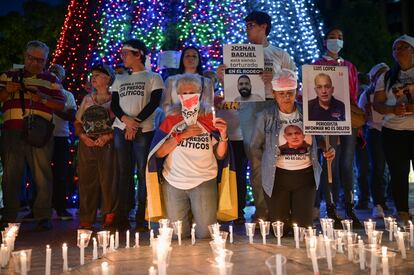In attempt to ease pressure, Maduro announces release of over 100 protesters detained after contested election
The measure adds to another 225 conditional releases made last month in the middle of a legitimacy crisis for the Chavista regime


Venezuela reached a peak of more than 2,000 arrested protesters after the presidential elections. Four months later, the government is beginning to release some of these people from prison. According to a statement from the Vice Presidency of Citizen Security and Peace — headed by Diosdado Cabello, who serves as the interior minister and is also the Chavista movement’s second-highest leader — there have been 103 releases since Tuesday, although human rights organizations that defend political prisoners have only been able to confirm 25 as of Thursday. According to the authorities, these measures are in addition to another 225 releases granted in November, but which have not been fully implemented either.
Of the individuals released this week, at least 19 are teenagers out of a group of more than 150 people who were arrested during protests on July 29 and 30 across the country. Protesters were rejecting the results announced by the National Electoral Council proclaiming President Nicolás Maduro the winner of the election, without presenting disaggregated data and amid allegations of fraud by the opposition. The cases of the minors, who are between 14 and 17 years of age, have generated international condemnation and have kept their mothers at the forefront of protests and continuous vigils to demand their freedom. Most of the detainees have been accused of terrorist crimes. Many of them were arrested during protests in street raids in which the police found political content against the government on their phones, or who were reported by their neighbors as being opponents, a practice that is promoted by the State.
Maduro is now trying to ease the pressure amid a crisis of legitimacy triggered by the election. The inauguration is due to take place in less than a month, in a new milestone after which the international community could enter a new phase of disavowal of his presidency, as happened in 2019, after the questioned elections of 2018 in which the opposition was not allowed to participate. The Chavista regime has responded to criticism of the July election with severe repression, even leading the opposition candidate Edmundo González Urrutia to agree to go into exile in Spain, from where the latter continues to defend his electoral victory and assures that on January 10 he will be back in Venezuela to wear the presidential sash. Maduro has accused him of “provoking a civil war.”
The advance manoeuvres to hold on to power at all costs have also given new urgency to the probes into human rights violations against the Venezuelan government, with an open investigation at the International Criminal Court. The Fact-Finding Mission has denounced the reactivation of the repressive apparatus after the elections with arbitrary detentions, short-term forced disappearances, ill-treatment and sexual violence.
Chavismo is trying to give signs that it is promoting democratic guarantees. This Friday the High Commissioner for Human Rights will provide an update on the situation in Venezuela. Officials from this organization returned to the country at the end of November, after being expelled by Maduro last February when they reported the disappearance and detention of activist Rocío San Miguel, a dual Spanish-Venezuelan citizen, of whom the first images were released this week confirming her condition after being arrested when she was about to take an international flight, then tried for treason and conspiracy. Alongside these gestures, the arrests of political leaders continue to occur, such as the case of former councilman Jesús Armas, taken by hooded men and whose whereabouts are still unknown.
Missing Spanish-Venezuelan citizen
Human Rights Watch has demanded that the Venezuelan government provide information about Sofía María Sahagún Ortíz, another Venezuelan-Spanish citizen who has been missing since October 23, as she was about to board a flight at Maiquetía Airport. “The Venezuelan government should urgently clarify whether Sofía María Sahagún Ortíz, a Venezuelan-Spanish citizen, has been arrested, reveal her whereabouts, the reasons for her detention, and guarantee respect for her rights,” the statement said.
The organization adds that according to information provided by her relatives, Sahagún Ortíz sent a text message to her husband telling him that she had passed passport control and then learned the next day that she had not been allowed to board the plane, but were not told what happened next. Her family has repeatedly asked Venezuelan authorities to reveal whether she is being held. “Sahagún Ortíz appears to be the victim of an enforced disappearance, a serious crime under international law and, unfortunately, common these days in Venezuela,” said Juanita Goebertus, Americas director at Human Rights Watch.
Sign up for our weekly newsletter to get more English-language news coverage from EL PAÍS USA Edition
Tu suscripción se está usando en otro dispositivo
¿Quieres añadir otro usuario a tu suscripción?
Si continúas leyendo en este dispositivo, no se podrá leer en el otro.
FlechaTu suscripción se está usando en otro dispositivo y solo puedes acceder a EL PAÍS desde un dispositivo a la vez.
Si quieres compartir tu cuenta, cambia tu suscripción a la modalidad Premium, así podrás añadir otro usuario. Cada uno accederá con su propia cuenta de email, lo que os permitirá personalizar vuestra experiencia en EL PAÍS.
¿Tienes una suscripción de empresa? Accede aquí para contratar más cuentas.
En el caso de no saber quién está usando tu cuenta, te recomendamos cambiar tu contraseña aquí.
Si decides continuar compartiendo tu cuenta, este mensaje se mostrará en tu dispositivo y en el de la otra persona que está usando tu cuenta de forma indefinida, afectando a tu experiencia de lectura. Puedes consultar aquí los términos y condiciones de la suscripción digital.








































